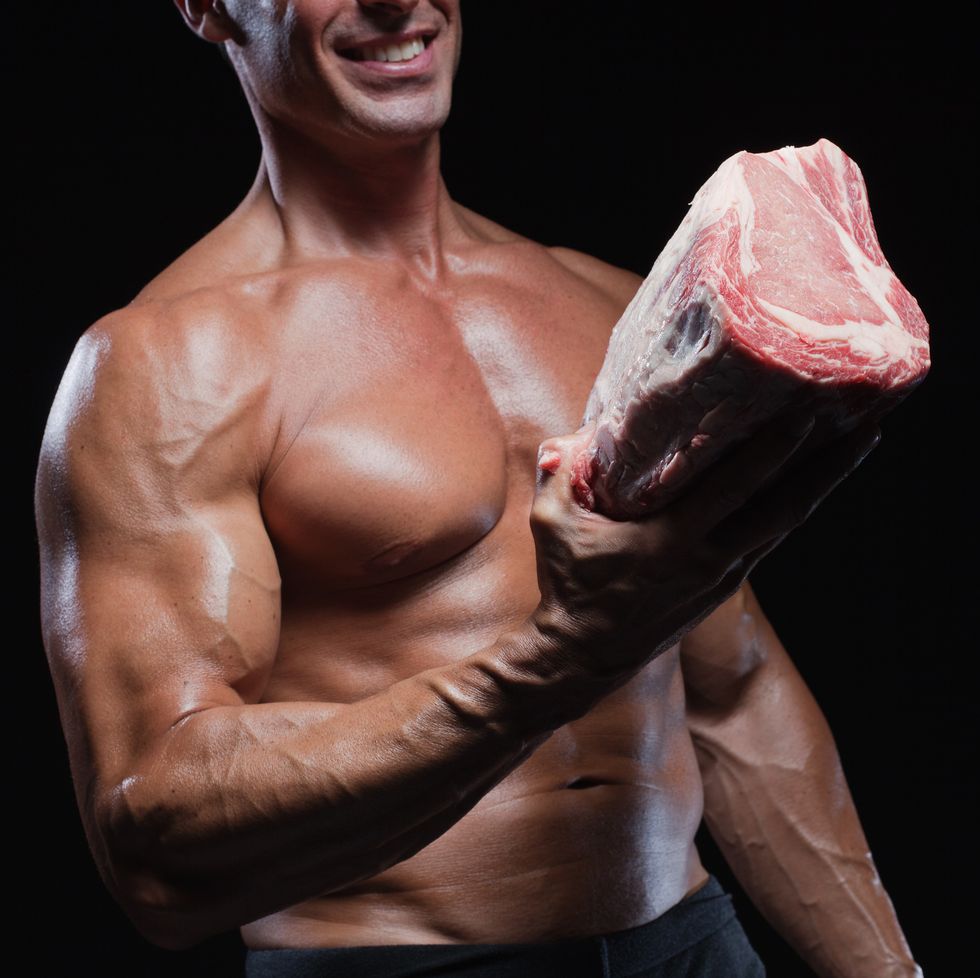EVEN THOUGH IT feels like we’re in the thick of a protein boom, we’ve known about the importance of the nutrient for a very long time.
In fact, back when protein was discovered in the early 1800s, scientists named the compound after the Greek word prota, meaning “primary”. It’s aptly named—the importance of protein has been irrefutable since.
Protein is vital to maintaining muscle mass and building strength, as well as filling up after eating and staying satisfied between meals. The thing about protein, though, is you need to hit the minimum amount for these effects to take place.
But, nearly 1 in 3 older Americans are missing the mark on protein intake. And, trust us, you don’t want to be low on protein. Here’s how to know how much you need.
What is protein?
Protein is made from amino acids that are essential for building and maintaining muscles and bones. In addition, recent studies suggest that protein quality, or the total makeup of amino acids within a protein source, may become more important as you age.

But beyond your infrastructure, protein also helps to regulate a host of cellular processes, affecting everything from your immune function to the transportation of oxygen through the bloodstream. Protein can even aid in weight loss: Researchers have found that consuming it stimulates the release of satiety signals in the small intestine, helping you feel full.
How much protein do you need?
Probably more than you’re currently eating.

That might be because protein’s recommended daily allowance is a modest 0.8 grams per kilogram of body weight per day, a number formulated during World War II in order to safeguard public health during a possible shortage and ensure the nutritive value of military rations.
“That RDA means roughly 8 to 10 percent of your daily intake should be protein,” says Heather Leidy, Ph.D., a protein researcher and associate professor at the University of Texas at Austin.
But that 8 to 10 percent is only the minimum required to prevent a protein deficiency, not what you need for protein synthesis, muscle gain, satiety, weight management, and glycemic control.

While the diets of most Americans may contain between 10 and 15 percent protein, Leidy notes, research suggests that anywhere from 20 to 30 percent would be a better health goal—with at least 30 grams of protein being the minimum threshold at mealtime.
The good news is that higher amounts of protein as a result of all these snacks and shakes won’t harm the liver, kidneys, or bones of healthy people, as some once claimed; however, excess protein can mean excess calories, which may lead to weight gain, Leidy says.
Still, that’s a lot of protein, you might be thinking to yourself. If you read into it, you may think you need to break out your calculator and begin tracking your intake—but we swear it’s not as complicated as you might think.
Actually, it’s pretty easy.
How much protein should I eat to lose weight?
Regardless of your goal the answer is simple: 30 grams of protein at every meal.

A 180-pound guy who wants to maintain his current weight would need 100 to 130 grams, or six palm-sized portions of protein-rich foods, every day. That’s about 30 grams at each meal and an additional 10 to 20 grams in two snacks. Chicken breast is great, but so are chicken thighs, salmon, pork, shellfish, whitefish, lamb, and much more.
Some plant foods that are high in protein: soybeans (and tofu, and soy milk), quinoa, chickpeas, lentils, any kind of nut, peas, any kind of bean, and seitan.
And don’t forget that a heaping scoop of most protein powders will net you 25 to 30 grams of the nutrient.
How much protein should I eat to build muscle?
There’s one exception to the 30-gram rule, and it pertains to people who are looking to build muscle. Doing so requires more protein than the baseline level, as protein helps to repair muscle tears that occur during heavy lifting—and lead to more muscle growth.
Experts differ on what the exact amount of protein you need to build muscle, but the general consensus is that if your goal is muscle gain you should consume 1 gram of protein for every pound of your target body weight.
So if you want to weigh a muscle-stacked 185, that’s 185 grams of protein daily.
Do protein needs change as you age?
Yes, because muscle mass decreases with age.
Known medically as sarcopenia, it’s a natural occurrence to lose muscle mass and strength as a result of getting older. As the body ages, you become less responsive to the stimuli of amino acids, making it difficult to maintain and gain muscle. And while you can’t do anything to prevent it, you can do some things to combat it.
One of those things (shocker) is intaking more protein. Studies have shown that a protein intake of 1.2 to 2.0 grams of protein per kilogram of body weight is best for adults over 65—a far cry from the 0.8 grams per kilogram that is outlined in the recommended daily allowance outlined by the USDA.
If you’re getting older, increase your protein intake and add some strength training into your routine, and you’ll maintain your muscle mass longer.
What happens if you don’t get enough protein?
At best, you won’t build the muscle you want and you may find yourself snacking more often, which can lead to weight gain. At worst, you may suffer a protein deficiency—which is not something to be trifled with.
